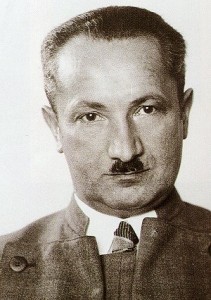From philosopher Martin Heidegger’s lectures in the winter semester of 1929-1930 on “The Fundamental Concepts of Metaphysics.” The Great War (1914-1918) had ended over a decade before but, Heidegger argued, its world-historical significance must not be lost. So the professor is explaining to his students what Germany needs:
“We must first call for someone capable of instilling terror into our Dasein again. For how do things stand with our Dasein when an event like the Great War can to all extents and purposes pass by without leaving a trace? Is this not perhaps a sign that no event, however momentous it may be, is capable of assuming this task if a man has not prepared himself for awakening in the first place?”

The remark is striking, as Heidegger joined the Nazi Party three years later—that is, before it was known that Adolf Hitler and the National Socialists would come to power. A hotly-debated question is still:
To what extent is Heidegger’s basic philosophy implicated in his politics? Also: To what extent was the university professor was already promoting national-socialistic ideology prior to significant National Socialist electoral success?
Sources: Quoted in William H. F. Altman, Martin Heidegger and the First World War: Being and Time as Funeral Oration (Lexington Books, 2012), p. 78. Originally in The Fundamental Concepts of Metaphysics, translated by William McNeill and Nicholas Walker (Bloomington: Indiana University Press, 1995) p. 172.
Related: Heidegger’s basic anti-reason philosophy, in the Philosophers, Explained series.

A proper analogy is common for physicians: serving clients who are on their way to death from heart attack, but live complacently—until an actual attack terrorizes them into taking remedial action. Heidegger lecturing soon after the Crash, but the Depression hadn’t yet really set in.
What’s striking is that you’re apparently wanting to associate Heidegger with nazism, so you read retrospectively, as if there was a dark secret concealed.
Heidegger did not join the party voluntarily. The new regime required that all public officials join the party. He wrote (1946) that he never attended a Party meeting. No one has countered that claim.